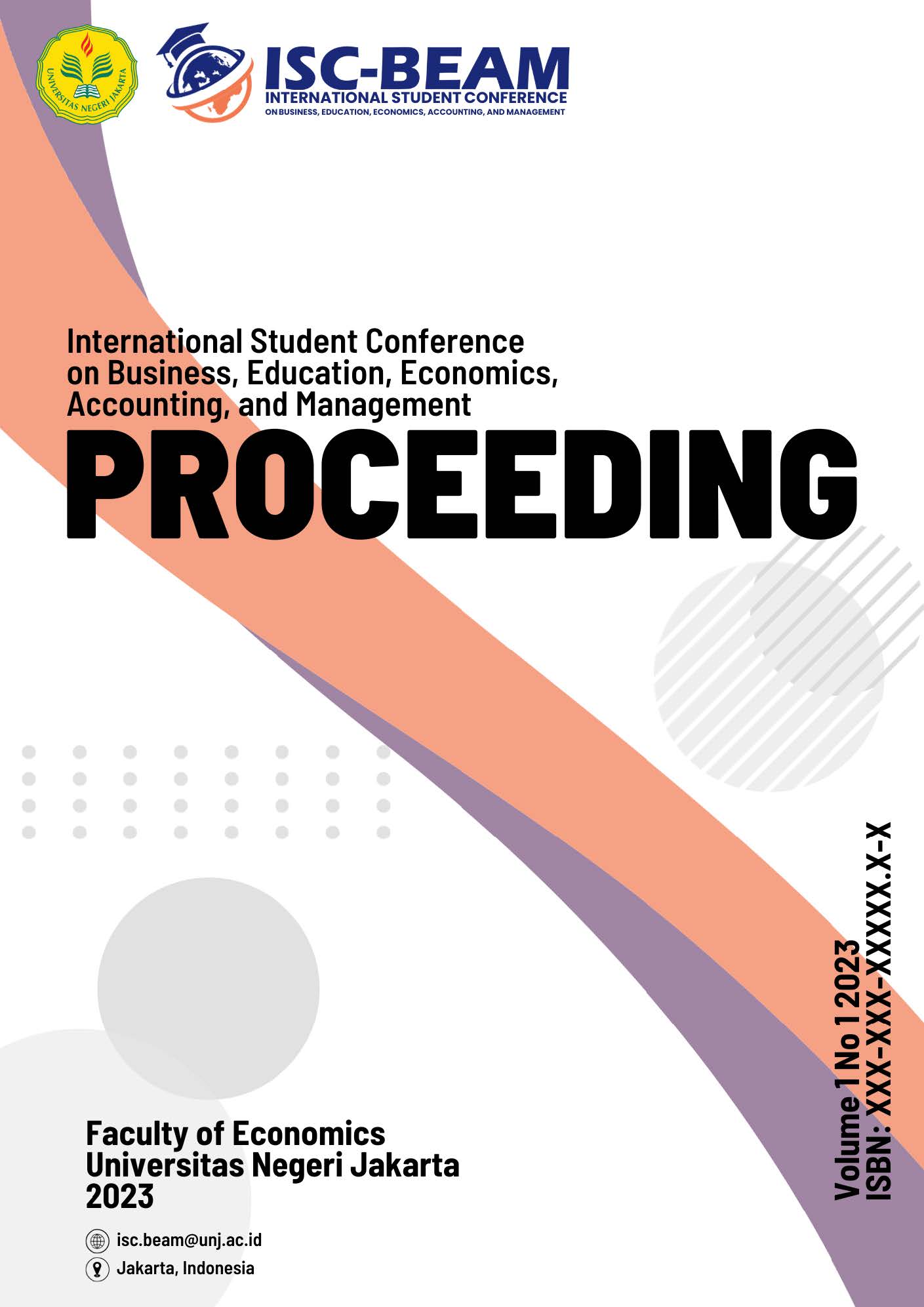Saving Behavior Factors that Influence Generation Z Saving Behavior
DOI:
https://doi.org/10.21009/ISC-BEAM.011.45Keywords:
Financial Literacy, Financial Inclusion, Saving BehaviorAbstract
This study's goal is to ascertain the factors that influence generation Z's saving behavior. The problem studied is that many young people today are still not aware of saving. In various studies there are theories of saving behavior, financial inclusion, and financial literacy, so a systematic literature review is needed to reaffirm the definition, concept, measurement and operationally in related dimensions and indicators. The author uses grounded theory with a literature study method in this qualitative research so as to provide the right position in the direction of updating indicators such as saving behavior, financial inclusion, and financial knowledge. The literature study's findings indicate that financial literacy influences saving behavior and financial inclusion, financial inclusion affects saving behavior. Recommendations to future researchers to be able to follow up this research in analyzing other factors, on a wider scale, and measuring qualitatively and empirically.
References
Amilia, S., Bulan, T. P. L., & Rizal, M. (2018). Pengaruh Melek Finansial, Sosialisasi Orang Tua, dan Teman Sebaya Terhadap Perilaku Menabung Mahasiswa Bidik Misi Fakultas Ekonomi Universitas Samudra. Jurnal Samudra Ekonomika, 2(2), 97–107.
Astini, K. P. A., & Pasek, G. W. (2022). Pengaruh literasi keuangan terhadap keputusan investasi. JIMAT (Jurnal Ilmiah Mahasiswa Akuntansi), 13(3), 991–1002.
Bakhtiar, F., Prayoga, R., & Mulya, A. (2022). Analisis literasi keuangan dan financial technologyterhadap inklusi keuangan pada pelaku UMKM perempuan. Akuntabel, 19(2), 260–268. https://doi.org/10.30872/jakt.v19i2.11178
Firamadhina, F. I. R., & Krisnani, H. (2021). Perilaku Generasi Z terhadap Penggunaan Media Sosial TikTok: TikTok sebagai Media Edukasi dan Aktivisme. Share : Social Work Journal, 10(2), 199. https://doi.org/10.24198/share.v10i2.31443
Jumlah Penduduk, B. (2020). Badan Pusat Statistik. BPS. https://sensus.bps.go.id/topik/tabular/sp2020/2/0/0
Kasiyan, -. (2015). Kesalahan Implementasi Teknik Triangulasi Pada Uji Validitas Data Skripsi Mahasiswa Jurusan Pendidikan Seni Rupa FBS UNY. Imaji, 13(1), 1–12. https://doi.org/10.21831/imaji.v13i1.4044
Literasi Keuangan. (n.d.).
Michaela, O., Anastasia, N., Kristen, U., & Surabaya, P. (2022). the Effect of Saving Behavior and Financial Literacy on Investment Decisions in the Generation Z Capital Market in Surabaya. 116–126.
Nurlaela Reni, & Bahtiar Dandi. (2022). Pengaruh Literasi Keuangan, Inklusi Keuangan dan Perencanaan Keuangan Terhadap Perilaku Menabung. Bisnis dan Manajemen, 5(3).
Ozili, P. K. (2018). Impact of digital finance on financial inclusion and stability. Borsa Istanbul Review, 18(4), 329–340. https://doi.org/10.1016/j.bir.2017.12.003
Pangestu, S., & Karnadi, E. B. (2020). The effects of financial literacy and materialism on the savings decision of generation Z Indonesians. Cogent Business and Management, 7(1). https://doi.org/10.1080/23311975.2020.1743618
Perangin-angin, N., Fachrudin, K. A., & Irawati, N. (2022). The effect of financial literacy, financial inclusion and financial attitude on saving behavior with self control as moderation: study on households in Cingkes Village, Dolok Silau District, Simalungun Regency. International Journal of Research and Review, 9(1), 470–477.
Rahayu, Y., & Nurfauziah, F. L. (2020). Saving Behavior In Generation Z. Sentralisasi, 9(2), 87. https://doi.org/10.33506/sl.v9i2.915
Raszad, S. E. F., & Purwanto, E. (2021). Faktor-Faktor Yang Mempengaruhi Perilaku Menabung (Studi Pada Mahasiswa Perguruan Tinggi Negeri Di Kota Surabaya). Jurnal Ilmiah Manajemen Ubhara, 3(2), 51. https://doi.org/10.31599/jmu.v3i2.966
Saad, Bani, A. F. A. (2019). Jurnal Ilmu Manajemen Oikonomia. LIlmu Manajemen, 14(1), 1–16.
Salim, A. S., & Pamungkas, A. S. (2022). The Influence of Financial Literacy, Parental Socialization, and Peer Influences on Saving Behavior. Proceedings of the 3rd Tarumanagara International Conference on the Applications of Social Sciences and Humanities (TICASH 2021), 655(Icebm 2021), 560–566. https://doi.org/10.2991/assehr.k.220404.217
Sekarwati, M. A., & Susanti. (2020). Pengaruh Literasi Keuangan, Inklusi Keuangan dan Modernitas Individu Terhadap Perilaku Menabung Mahasiswa Perguruan Tinggi Negeri Surabaya. Jurnal Ekonomi Keuangan Dan Manajemen, 16(2), 268–275. https://journal.feb.unmul.ac.id/index.php/INOVASI/article/view/7720/1099
Setyowati, E., Zulaihati, S., & Fauzi, A. (2023). Nexus Synergy : A Business Perspective The Effect of Financial Literacy and Peers towards Saving Behavior with Self-Control as Mediating Variable of Undergraduate Students of Jakarta State University. 1(2019), 61–71.
Soares, S. (2019). The Effect Of Self Control And Financial Literacy For Student’s Saving Behavior. Nhk技研, 151, 10–17.
Weinstock, L. R. (2022). Introduction to U.S. Economy: Personal Saving. https://crsreports.congress.gov/product/pdf/IF/IF10963
World Bank. (2022). Gross Saving. Databank.Worldbank.Org. https://databank.worldbank.org/metadataglossary/world-development-indicators/series/NY.GNS.ICTR.ZS






